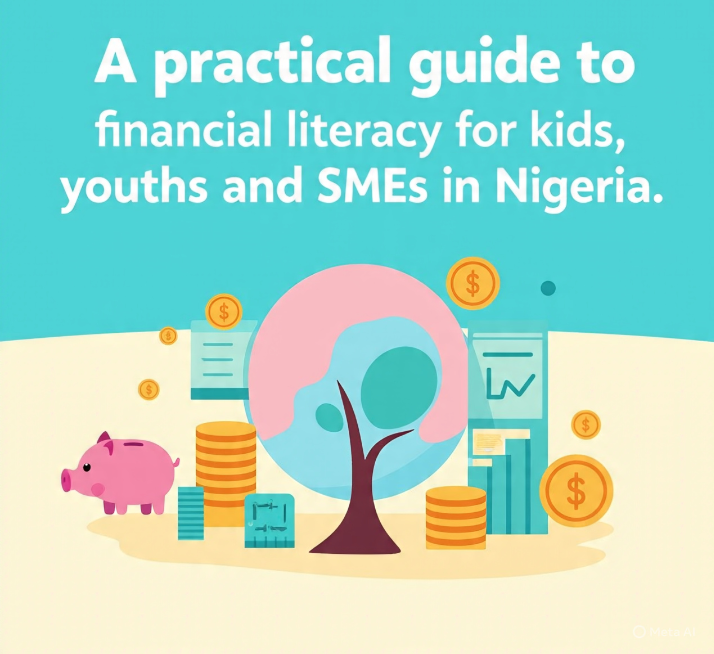💸 Fintech vs Traditional Banks in Nigeria: How Smart Nigerians Are Growing Their Money with High-Yield Savings Apps
Fintech vs Traditional Banks in Nigeria: How Smart Nigerians Are Growing Their Money with High-Yield Savings Apps
Nigeria financial sector is evolving, a quiet revolution is underway. Traditional banks, once the dominant players, are facing threatening business competition from fintech companies that offer innovative, user-friendly, and mobile-based solutions. At the heart of this shift are high-yield savings apps that enable Nigerians to grow their money with ease and efficiency.
📘 Table of Contents
1. Introduction
2. What Is Fintech?
3. What Are Traditional Banks?
4. Fintech vs Traditional Banks: Key Differences
5. Advantages of Fintech Platforms
6. Disadvantages of Fintech Platforms
7. Advantages of Traditional Banks
8. Disadvantages of Traditional Banks
9. 8+ Savings Apps in Nigeria Paying More Than Your Bank
10. How to Choose the Right Savings App
11. How to Start Saving and Earning Interest Step-by-Step
12. Conclusion: Save with Sense, Grow with Intention
13. Disclaimer
🛒 Introduction
Discover how making money is easier with fintech apps compared to traditional banks in Nigeria. A must read!
Let’s be honest: your bank is playing you.
They charge you for everything — card maintenance, SMS alerts, transfer fees — and in return, they pay you next to nothing.
Meanwhile, inflation is eating your savings alive.
But the game is changing.
Fintech platforms are now offering 12%–28% annual interest, with flexible savings options and dollar-based returns. If you’re still leaving your money in a traditional bank account that pays 3% or less, you’re losing value every day.
This guide will help you understand the difference between fintech and traditional banks, and introduce you to 8+ savings apps smart Nigerians are using to grow their money.
💡 What Is Fintech?
Fintech (short for financial technology) refers to digital platforms that use technology to deliver financial services — including savings, loans, payments, investments, and insurance.
Examples of Fintech Services:
• Mobile banking apps
• Peer-to-peer lending platforms
• Digital wallets
• Investment apps
• Automated savings tools
Fintech is designed to be fast, flexible, user-friendly, and accessible — especially for underserved populations.
🏦 What Are Traditional Banks?
Traditional banks are brick-and-mortar financial institutions that offer services like savings accounts, current accounts, loans, and fixed deposits.
They are regulated by the Central Bank of Nigeria (CBN) and have physical branches across the country.
Examples:
• First Bank
• Zenith Bank
• Access Bank
• UBA
• Fidelity Bank
⚖️ Fintech vs Traditional Banks: Key Differences
Feature Fintech Platforms Traditional Banks
Interest Rates 12%–28% annually 2%–5% annually
Accessibility Mobile-first, 24/7 Branch-based, limited hours
Charges Minimal or zero fees Multiple hidden charges
Flexibility Save in naira or dollars Mostly naira-based
Speed Instant transactions Delays and queues
Innovation Constant updates Slow to adapt
✅ Advantages of Fintech Platforms
• Higher Returns – Up to 28% interest annually
• Flexible Saving Options – Lock, autosave, spend-to-save
• Dollar Savings – Protect against naira depreciation
• Low Fees – No card maintenance or transfer charges
• User-Friendly Apps – Easy to navigate and manage
⚠️ Disadvantages of Fintech Platforms
• Limited Physical Presence – Mostly online support
• Newer Players – Some platforms are still building trust
• Requires Internet Access – Not ideal for offline users
• Risk of App Shutdowns – Always check for CBN licensing and NDIC insurance
✅ Advantages of Traditional Banks
• Established Trust – Long history and brand recognition
• Physical Branches – Face-to-face customer service
• Wide ATM Network – Easy cash access
• Regulated by CBN – Strong oversight
⚠️ Disadvantages of Traditional Banks
• Low Interest Rates – Often below inflation
• Hidden Charges – SMS alerts, card fees, maintenance fees
• Slow Service – Long queues and bureaucratic delays
• Limited Innovation – Few digital tools or flexible savings options
💰 8+ Savings Apps in Nigeria Paying More Than Your Bank
1. PiggyVest
• SafeLock: Up to 22%
• Autosave: Up to 18%
• FlexNaira: 12%
• FlexDollar: 7%
• Group Savings: Used for land ownership and community goals
2. Renmoney
• RenVault: Up to 28%
• RenFlex: 18% with zero withdrawal penalties
• Regulated and secure
3. FairMoney
• FairLock: 16%–28%
• FairSave: 17% with daily interest
• Promo Offers: Up to 30% for new users
4. Cowrywise
• Mutual Funds: 17%–24% returns
• Halal Savings: Non-interest options for Muslims
• SEC Regulated
5. Kuda Bank
• Fixed Savings: Up to 12%
• Spend+Save: Automatically saves when you spend
• No transfer or card fees
6. Nearpays
• Locked Savings: Up to 24%
• Aggressive returns for early adopters
7. ALAT by Wema
• Goal-Based Savings: Up to 17%
• Nigeria’s first fully digital bank
8. Risevest
• Dollar Savings: Protects against naira depreciation
• Global Investments: Diversify into US stocks and ETFs
9. Bonus: Opay
• Save-As-You-Spend: Great for casual savers
• Emergency Fund: Quick access when needed
🧭 How to Choose the Right Savings App
• Check CBN Licensing – Ensure the platform is regulated
• Look for NDIC Insurance – Protect your deposits
• Compare Interest Rates – Choose based on your goals
• Read Reviews – See what other users are saying
• Test the App – Try with a small amount first
📈 How to Start Saving and Earning Interest Step-by-Step
Step 1: Choose a Platform
Pick from PiggyVest, Cowrywise, Renmoney, etc.
Step 2: Download the App
Available on Play Store and App Store.
Step 3: Create an Account
Use your BVN, email, and phone number.
Step 4: Fund Your Wallet
Transfer from your bank or use a debit card.
Step 5: Select a Savings Plan
Choose fixed, flexible, or dollar savings.
Step 6: Monitor Your Growth
Track interest, withdrawals, and savings goals.
Read Also 20 LOW COST SIDE HUSTLES NIGERIANS CAN START https://financialliteracy.com.ng/20-low-cost-side-hustles-nigerians-can-start-today-how-to-launch-monetise-and-scale/
FAQs: Fintech vs Traditional Banks in Nigeria: How Smart Nigerians Are Growing Their Money with High-Yield Savings Apps
1. What is the difference between fintech apps and traditional banks in Nigeria?
Fintech apps focus on digital-first, innovative financial services like high-yield savings, investment options, and instant transactions. Traditional banks offer a wider range of services but with lower interest rates and more bureaucracy.
2. Are high-yield savings apps in Nigeria safe?
Most licensed fintech apps are regulated by the Central Bank of Nigeria (CBN) and insured through partnerships. However, users should always verify licensing and read reviews before investing.
3. Why do fintech apps offer higher interest rates than banks?
Fintechs operate with lower overhead costs and focus on customer acquisition, allowing them to pass higher returns to savers compared to traditional banks.
4. How do I know if a savings app is legitimate in Nigeria?
Check if the app is registered with the CBN, has NDIC insurance for funds, transparent terms, and a solid track record of customer trust.
5. Can I withdraw my money anytime from a fintech savings app?
Yes, most apps allow flexible withdrawals, though some high-yield plans may require lock-in periods for maximum returns.
6. Do traditional banks in Nigeria offer competitive savings rates?
Traditional banks typically offer very low savings rates (often below inflation), making fintech alternatives more attractive for wealth growth.
7. What are the risks of using fintech savings apps?
Risks include regulatory changes, app shutdowns, or security breaches. Choosing well-established platforms reduces these risks.
8. How much interest can I earn on fintech savings apps compared to banks?
While banks may offer as low as 1–2% annually, fintech savings apps often offer between 8–15% or more, depending on the product.
9. Who should use high-yield savings apps in Nigeria?
They are ideal for students, professionals, entrepreneurs, and anyone looking to grow money faster than with a traditional bank savings account.
10. Can I use both fintech apps and traditional banks together?
Yes. Many Nigerians use banks for salary deposits and regulated transactions, while fintech apps are used to grow savings and investments.
🧠 Conclusion:
Save with Sense, Grow with Intention
Money is moving — away from traditional banks that starve you, and into fintech platforms that reward you.
If you’re serious about wealth, stop leaving your money where it earns nothing.
Position it where it grows.
Caveat: This is not an endorsement. Always do your due diligence and save with sense.
🛡 Disclaimer
financialliteracy.com.ng blog is only an educational enlightenment entity with aim to educate and equip Nigerians on prudent management of their resources and money.
We do not promote affiliate links or run investment portfolios.
Do your own research before investing as our contents are meant for educational purposes only.
What is financial literacy? Financial literacy is the possession of skills, knowledge, and behaviours that allow an individual to make informed decisions regarding money.
Content Resource Links
PiggyVest vs Cowrywise: Which Savings App Is Best for Nigerians in 2025? (Moneymatters)
How fintechs are changing Nigerians saving culture (BusinessDay NG)



